
-
 Moscow, Kyiv end Russian gas transit to Europe via Ukraine
Moscow, Kyiv end Russian gas transit to Europe via Ukraine
-
Carter's Middle East peace legacy survives, but mostly in name

-
 South Korea investigators vow to execute Yoon arrest warrant
South Korea investigators vow to execute Yoon arrest warrant
-
South Korea says will send Jeju Air crash black box to US

-
 Navarro stunned by wildcard as Dimitrov cruises in Brisbane
Navarro stunned by wildcard as Dimitrov cruises in Brisbane
-
Tintin, Popeye, Hemingway among US copyrights expiring in 2025

-
 Cavs top Lakers in LeBron's first game at 40, Celtics crush Raptors
Cavs top Lakers in LeBron's first game at 40, Celtics crush Raptors
-
Finnish police probing seven sailors over cut cables

-
 Canada's Dabrowski reveals cancer treatment amid run to Olympic bronze
Canada's Dabrowski reveals cancer treatment amid run to Olympic bronze
-
Milan says no to all outdoor smoking in Italy's toughest ban

-
 Zverev out of United Cup with injury as Australian Open looms
Zverev out of United Cup with injury as Australian Open looms
-
FBI makes its largest bomb bust on Virginia farm

-
 Rain break helps Osaka overcome nerves to reach Auckland quarters
Rain break helps Osaka overcome nerves to reach Auckland quarters
-
Ex-India coach Shastri wants two-tier Test system after MCG blockbuster

-
 New year hope and joy reign in a Damascus freed from Assad
New year hope and joy reign in a Damascus freed from Assad
-
End of Russian gas via Ukraine sparks unease in eastern Europe

-
 Zelensky vows Ukraine will do everything in 2025 to stop Russia
Zelensky vows Ukraine will do everything in 2025 to stop Russia
-
Island-wide blackout hits Puerto Rico on New Year's Eve

-
 Serbia enters New Year with student protests over train station tragedy
Serbia enters New Year with student protests over train station tragedy
-
Romania, Bulgaria join borderless Schengen zone

-
 US Capitol riot fugitive seeks asylum in Canada
US Capitol riot fugitive seeks asylum in Canada
-
Musk flummoxes internet with 'Kekius Maximus' persona

-
 Venezuela opposition urges protests against Maduro's inauguration
Venezuela opposition urges protests against Maduro's inauguration
-
Syria's de facto leader meets minority Christians

-
 Suriname ex-dictator Bouterse to be cremated on Saturday
Suriname ex-dictator Bouterse to be cremated on Saturday
-
£1.5 mn reward offered after 'brazen' London gem raid

-
 Zimbabwe abolishes the death penalty
Zimbabwe abolishes the death penalty
-
Barcelona race against clock to register Olmo

-
 Arteta wants Arsenal to hammer away in title race
Arteta wants Arsenal to hammer away in title race
-
Panama marks canal handover anniversary in shadow of Trump threat

-
 Gaza hospital chief held by Israel becomes face of crumbling healthcare
Gaza hospital chief held by Israel becomes face of crumbling healthcare
-
Russian advances in Ukraine grew seven-fold in 2024, data shows

-
 US farmers fret over Trump's deportation plans
US farmers fret over Trump's deportation plans
-
BBC celebrates 100 years of 'poetic' shipping forecast
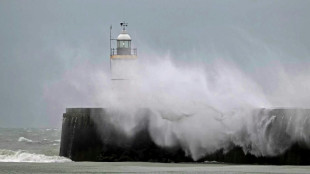
-
 West Ham's Bowen sidelined with foot fracture
West Ham's Bowen sidelined with foot fracture
-
Global markets rode AI, interest rate roller coaster in 2024

-
 Ocalan: PKK chief held in solitary on Turkish prison island
Ocalan: PKK chief held in solitary on Turkish prison island
-
Yemen's Huthis a 'menace' for Israel despite weakened Iran: analysts

-
 Rooney exit extends managerial struggles for England's 'golden generation'
Rooney exit extends managerial struggles for England's 'golden generation'
-
Gaza healthcare nearing 'total collapse' due to Israeli strikes: UN
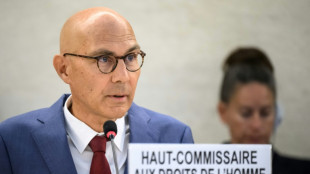
-
 German leaders hit back at Musk's support for far right
German leaders hit back at Musk's support for far right
-
Southgate won't be 'Sir' at home after knighthood

-
 Rooney leaves Plymouth after just seven months in charge
Rooney leaves Plymouth after just seven months in charge
-
Kyrgios needs 'miracle' after return from long injury layoff

-
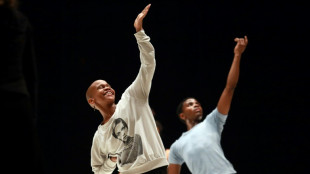 Celebrated S.African contemporary dancer Dada Masilo dies aged 39
Celebrated S.African contemporary dancer Dada Masilo dies aged 39
-
Five talking points at the midway point of the Premier League season

-
 Angelina Jolie and Brad Pitt reach divorce settlement
Angelina Jolie and Brad Pitt reach divorce settlement
-
Djokovic, Sabalenka win season-openers but Kyrgios loses on return

-
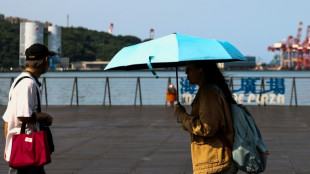 Taiwan says 2024 was hottest year on record
Taiwan says 2024 was hottest year on record
-
China says shared Covid information 'without holding anything back'
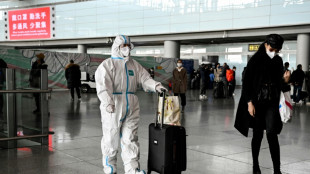

Skiing into the unknown: Beijing's man-made Olympic pistes
When the alpine skiers take to the piste at the Beijing Olympics this week, they will do so on artificial snow in an often drought-ridden region.
To the outsider, the idea of hosting ski events in Yanqing, in a largely uninhabited area north of the Chinese capital that is often parched, might seem alien.
The National Alpine Skiing Centre has been man-made, tucked away up an anonymous valley.
Streaks of white are etched into a barren-looking series of steep rocky hills -- sparsely forested and in places covered by huge sheets of wire netting.
The hills were once part of the Songshan National Nature Reserve.
Thousands of gallons of water have been used to create the snow on the course. There is no outlying snow to speak of.
The venue is linked to downtown Yanqing district by a brand-new motorway that shoots through a series of long tunnels and culminates in a raised jumble of roads.
A string of red bubble-cars quickly transports skiers up to the slopes past the sliding centre on the left that will be used for luge, skeleton and bobsleigh events, while the Olympic Village for the mountain competitors is on the right.
Soldiers man the mid-station of the lift, decked out in green greatcoats and oversized caps.
A road used for bus transport for the final ascent winds circuituously below the bubble-cars, marked with the venue's logo and sporting Olympic stickers.
Passengers enjoy the luxury of heated seats -- and warmed salopettes are welcome with temperatures falling to minus 15 degrees Celsius (five degrees Fahrenheit) and made even colder higher up the course with the significant chill from a strong wind that constantly snaps the national flags.
The approach to the two pistes that will be used for the speed events -- the downhill and super-G -- and technical events (slalom and giant slalom) is nothing short of startling.
As hard as it is to believe for the onlooking layman, the concept of constructing pistes and using artificial snow is nothing new.
Four years ago, skiing at the Pyeongchang Olympics was held in a location with a strikingly similar topographical feel to that of Yanqing.
There too, an army of workers were brought in to construct not only the course layouts but also, importantly, manufacture the artificial snow employed for racing.
Racers in China, however, have not had the opportunity to try out the new pistes after World Cup races scheduled in 2020 and 2021 were cancelled because of Covid-19 restrictions.
From the little feedback there has been, the course is deemed steep, with a maximum gradient of 68 percent, and is sure to be testing given its icy surface on terrain that pitches and rolls and features four of five jumps.
"This might be one of the best racing mountains in the world," boasted Bernhard Russi, the "piste architect" who has been creating courses for the International Ski Federation since 1980, having won gold and silver for Switzerland in the Olympic downhills in 1972 and 1976.
"It's going to be a very challenging course."
Fabien Munier, coach of French medal hope Alexis Pinturault, said the course was also "undulating".
"We received a few videos this summer, there are some Chinese who train and exchanged details with the Austrians, but there's really very little information," he said.
"Snow conditions should be very cold and that changes a lot of things in relation to kit set-up, skis and boots. The snow will be aggressive, grippy."
Italian veteran Christof Innerhofer said on a scale from one to 10, "I would say that the difficulty of the downhill is seven".
"You can see that it is a track designed by Bernhard Russi," Innerhofer told Gazzetta dello Sport newspaper.
"There are no jumps, but several bumps and a traverse in the upper part, as in South Korea, even if overall it seems a bit more difficult to me."
Alberto Ghidoni, head of the Italian speed team, said the slopes were not for the faint-hearted, "not easy, very steep", and even went as far as questioning their future use.
"They're not for tourists in my opinion, even if here they would like to teach people to ski."
G.Machado--PC
